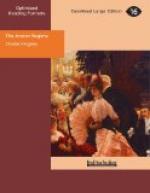I shall not trouble you with criticisms on French memoirs—of which those of Madame de Sevigne are on the whole, the most painful (as witness her comments on the Marquise de Brinvilliers’s execution), because written by a woman better and more human than ordinary. Nor with “Menagiana,” or other ’ana’s—as vain and artificial as they are often foul; nor with novels and poems, long since deservedly forgotten. On the first perusal of this lighter literature, you will be charmed with the ease, grace, lightness with which everything is said. On the second, you will be somewhat cured of your admiration, as you perceive how little there is to say. The head proves to be nothing but a cunning mask, with no brains inside. Especially is this true of a book, which I must beg those who have read it already, to recollect. To read it I recommend no human being. We may consider it, as it was considered in its time, the typical novel of the Ancien Regime. A picture of Spanish society, written by a Frenchman, it was held to be—and doubtless with reason—a picture of the whole European world. Its French editor (of 1836) calls it a grande epopee; “one of the most prodigious efforts of intelligence, exhausting all forms of humanity”—in fact, a second Shakespeare, according to the lights of the year 1715. I mean, of course, “Gil Blas.” So picturesque is the book, that it has furnished inexhaustible motifs to the draughtsman. So excellent is its workmanship, that the enthusiastic editor of 1836 tells us—and doubtless he knows best—that it is the classic model of the French tongue; and that, as Le Sage “had embraced all that belonged to man in his composition, he dared to prescribe to himself to embrace the whole French language in his work.” It has been the parent of a whole school of literature—the Bible of tens of thousands, with admiring commentators in plenty; on whose souls may God have mercy!
And no wonder. The book has a solid value, and will always have, not merely from its perfect art (according to its own measure and intention), but from its perfect truthfulness. It is the Ancien Regime itself. It set forth to the men thereof, themselves, without veil or cowardly reticence of any kind; and inasmuch as every man loves himself, the Ancien Regime loved “Gil Blas,” and said, “The problem of humanity is solved at last.” But, ye long-suffering powers of heaven, what a solution! It is beside the matter to call the book ungodly, immoral, base. Le Sage would have answered: “Of course it is; for so is the world of which it is a picture.” No; the most notable thing about the book is its intense stupidity; its dreariness, barrenness, shallowness, ignorance of the human heart, want of any human interest. If it be an epos, the actors in it are not men and women, but ferrets—with here and there, of course, a stray rabbit, on whose brains they may feed. It is the inhuman mirror of an inhuman age, in which the healthy human heart can find no more interest than in a pathological museum.




